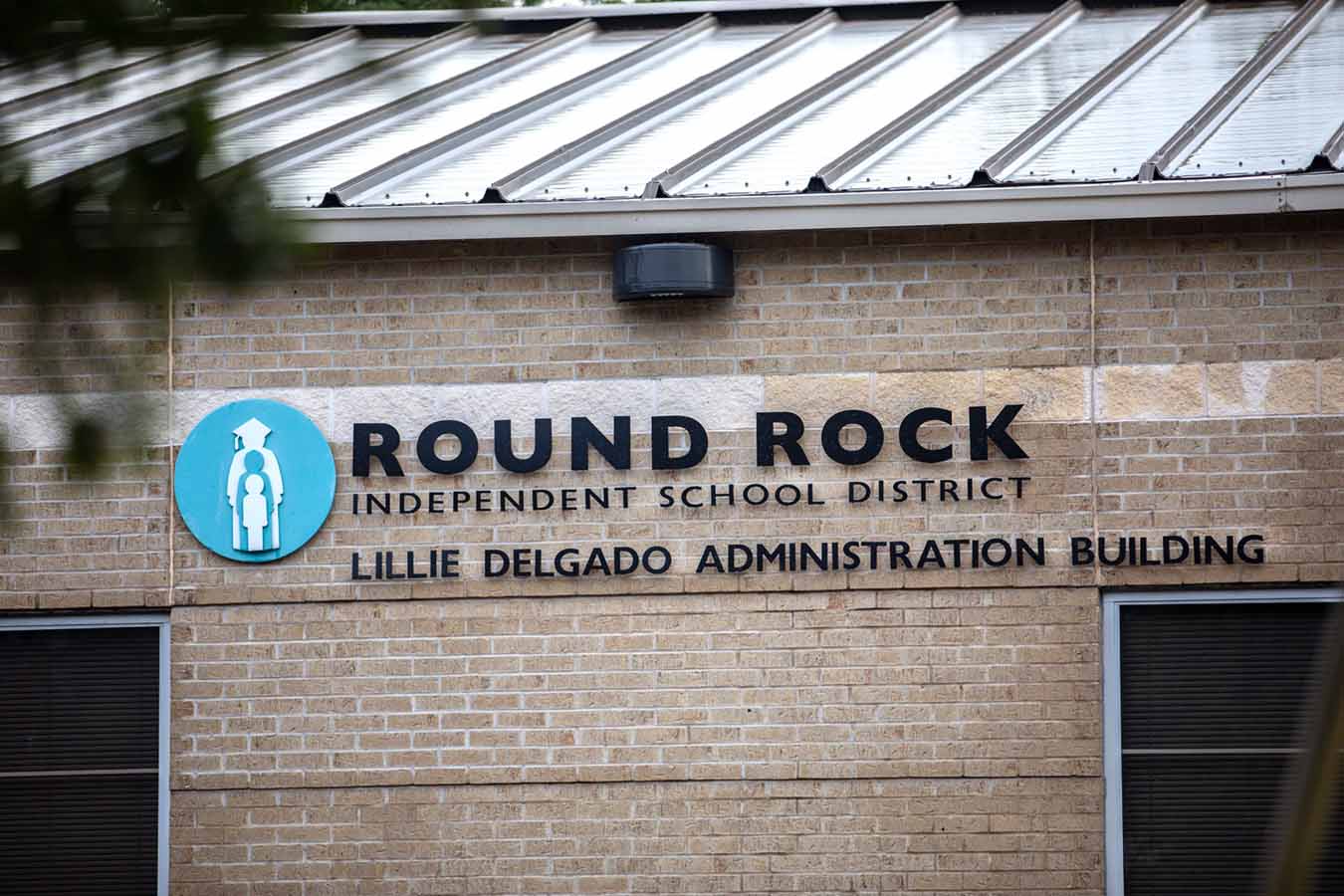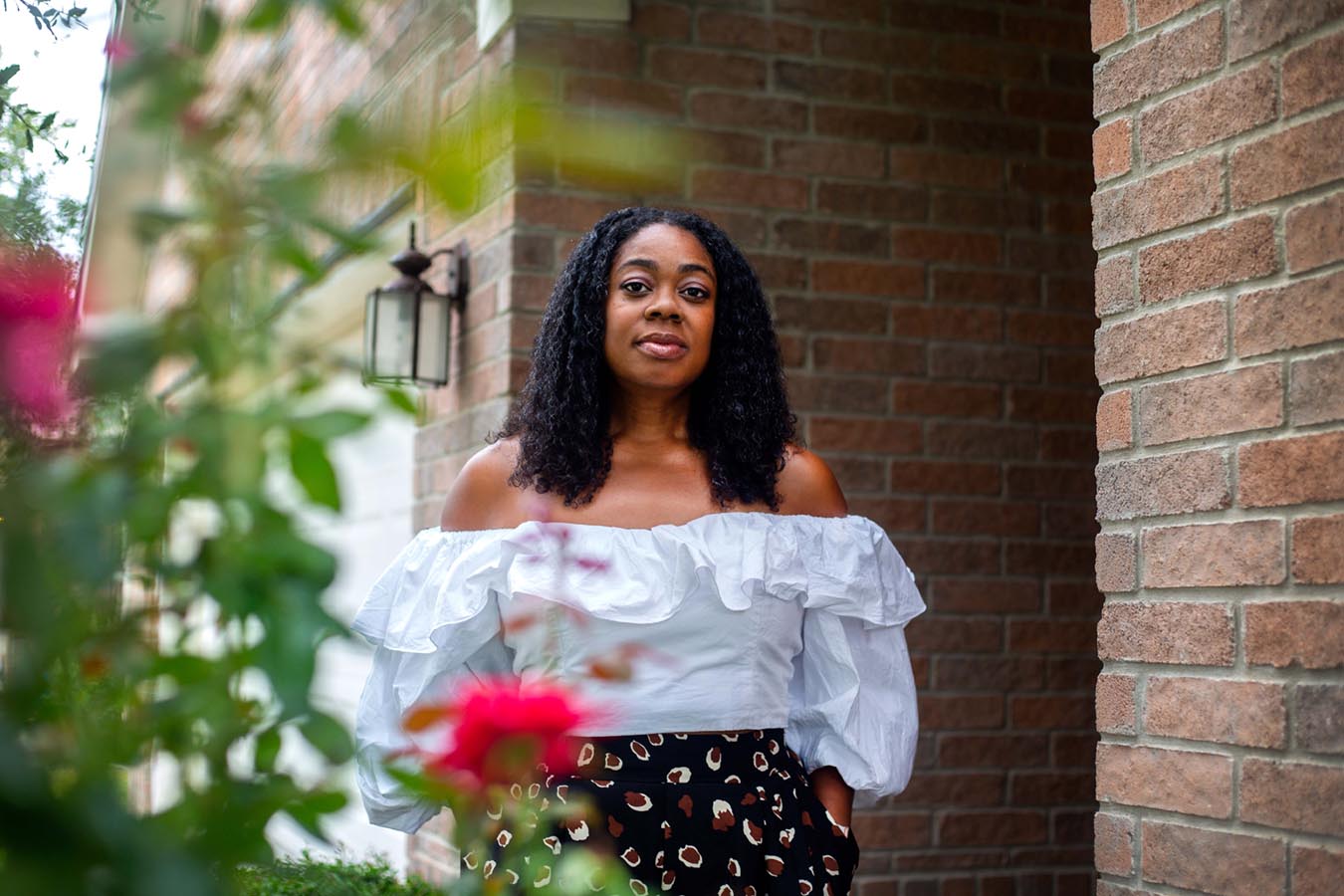On the second day of high school in Texas, Natosha Daniels’ 14-year-old daughter went all day without eating because she did not want to remove her mask.
The teen’s school has a couple of thousand students, and the cafeteria was crowded. Plus Round Rock Independent School District outside Austin didn’t require masks, so some students weren’t wearing them. Even her honors biology teacher was maskless.
Daniels said her daughter, who like her is fully vaccinated, is terrified of bringing home the virus because it could infect her 7-year-old sibling, who is too young for a shot.
“She was like, ‘Mama I’m going to pass out,’” said Daniels, a Round Rock Black Parents Association member and former assistant principal in the district.
“Every morning I wake up with knots in my chest, just like, ‘Am I making the right decision, putting myself and my child at risk for my older two to go to school?’” said Daniels, who is immunocompromised. “And my husband was like, ‘Well the option still stands for you to go get an Airbnb and move out’ with my youngest. … Do we sacrifice our savings? It’s so hard.”
After a difficult year or more of virtual learning, parents are eager to have their children back in classrooms. But even as the highly transmissible delta variant surges, school districts like Daniels’ aren’t beefing up protocols to prevent infections. Masks aren’t mandated or enforced, according to teachers, parents and officials in several states. Physical distancing is nearly impossible. To top it off, students exposed to covid may not be required to quarantine despite guidelines from the Centers for Disease Control and Prevention, risking an even more rapid spread among children, the youngest of whom aren’t yet eligible for vaccination.
The CDC advises quarantining up to 14 days for people who have had close contact with an infected person — within 6 feet for at least 15 minutes over a 24-hour period. (It exempts vaccinated people without symptoms.) This summer, the agency drafted an exception for schools: It’s not considered close contact if both the infected and exposed students “correctly and consistently” wore masks. That means an unvaccinated but masked student who was exposed wouldn’t have to quarantine.
But whether school districts follow CDC guidelines is an open question. And, in many cases, counties, states and the CDC don’t issue the same advice.
Even if districts follow CDC guidance, success hinges on whether students consistently wear masks. In Round Rock, for example, quarantine is “strongly” recommended for students and staff members who had close contact with those infected, essentially leaving it up to parents whether to take a child out of school.
“An optional quarantine just doesn’t work,” said Allison Stewart, lead epidemiologist at Williamson County and Cities Health District, which oversees 12 school districts including most Round Rock schools. When not required, “it seems that there’s only a cursory effort to actually identify contacts.” And then only “a cursory effort to quarantine.”
“There is more transmission occurring in a school setting than there is in the community right now,” Stewart said, “which is the exact opposite of what happened last year.”
The nation’s largest school districts are mostly not following the CDC’s close-contact exception for masked students, said Bree Dusseault, an analyst at the Center on Reinventing Public Education who is tracking state and district policies. The center reviewed 100 large and urban school districts and found that most of them gave students who are fully vaccinated and have close contact with an infected student an exemption from quarantine. Some require covid testing for students to return earlier than recommended, while others exempt those who’ve recently recovered from covid and, assumedly, have antibodies.
“Districts are managing on-the-ground politics,” Dusseault said. “You may find leaders relying less on scientific recommendations and data and more on local preferences” and on “what they’re hearing.”
“We know that masks aren’t perfect,” said Debra Pace, superintendent of the School District of Osceola County in Florida. Fully vaccinated people without symptoms are exempt from quarantine, but Osceola schools require any exposed students to quarantine for four to 10 days, depending on whether they showed symptoms or had a negative test.
“The delta variant is very different,” Pace said. “As much as I hate to quarantine kids, if we don’t quarantine, we risk having to shut a school down, which we absolutely don’t want to do.”
Each school’s decision about who counts as a close contact affects contact tracing, a laborious process officials use to slow the spread of disease. The CDC’s guidance curtails the number of school-based contacts for follow-up. Epidemiologists support the CDC’s approach, said Janet Hamilton, executive director of the Council of State and Territorial Epidemiologists. She added that having clear consequences for not wearing masks seems to resonate with parents: Kids who don’t mask up will miss more school.
“So many parents are interested — and I think rightly so — in having their children have in-person learning,” Hamilton said.
But in Round Rock, protocols are squishy in part because state orders and guidelines conflict with federal recommendations. Only after the courts got involved did Round Rock ISD add a strong mask mandate last Thursday — a week into school and after dozens of new positive cases and hundreds of new close contacts among students were reported.

Ben Sterling, president of the local teachers union Education Round Rock, said staffers and students alike are not incentivized to follow covid rules, particularly related to quarantine. For staff members, one round of quarantine would use all 10 days of personal and sick leave they get annually. Those days roll over, but Sterling knows of teachers with health issues who haven’t banked any. “The ones who are most vulnerable are going to get hit hardest, as per usual,” he said.
Dusseault said Round Rock’s policy is unusual because it’s optional. But the district is hardly alone — neighboring Leander ISD has a similar policy. Round Rock ISD requires anyone who tests positive for covid or is a probable case to quarantine for 10 days. For close contacts, it’s merely suggested “because parents and students have a right to a free, appropriate public education under the federal law,” said Jenny LaCoste-Caputo, Round Rock ISD’s chief of public affairs and communications.
Leniency about covid safety doesn’t sit well with Natosha Daniels. “I feel sick” about it, she said. “At best, they are, like, caving to this violent group of right-wing parents and, at worst, it’s like a blatant willingness to increase our community spread.”
Quarantine isn’t required for Round Rock employees because they would have to use personal and sick leave, LaCoste-Caputo said. The board of trustees approved covid leave only for staff members who test positive.
It is also “just not having the backing of our state government,” said Amy Weir, president of the Round Rock ISD board of trustees.
The Texas legislature did not fund virtual learning, so school districts are covering the costs themselves. Weir said Round Rock ISD is paying $17.5 million to offer virtual learning for students younger than 12, who cannot get vaccinated. For older students, teachers upload handouts of curated lessons.
On the second day of classes, the middle school where Sterling teaches saw its first case. He and another teacher said the student who tested positive was sometimes maskless and around others without masks. Yet, they said, the school told the families of that child’s classmates that no one was a close contact.
The school, they said, is not requiring seating charts, which would help staff members track student movement, nor do school officials know who is vaccinated or unvaccinated, which factors into the school district’s close-contact definition. It’s all handled on the honor system.
“You’re saying, ‘Choose between going to work and quarantining your child for 10 days,’” Daniels said. “This is the world that we are in — creates these systems that leave parents with no choice.”
This story was produced by KHN (Kaiser Health News), a national newsroom that produces in-depth journalism about health issues. Together with Policy Analysis and Polling, KHN is one of the three major operating programs at KFF (Kaiser Family Foundation). KFF is an endowed nonprofit organization providing information on health issues to the nation.



